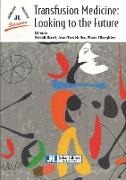Read more
"The history of blood transfusion is a fabulous human adventure in
the course of which intentional and fortuitous conjunction of medical
and scientific know-how resulted in the birth of a new medical
discipline. The extraordinary revelation of these successive stages
in which applied research predominated was the unsuspected potential
of blood and bone marrow cells. This potential extends to a great
number of pathologies, many of which are outside the field of hematology.
Pursuing the development of this therapeutic potential is the
challenge to be taken up in the next decade. No matter what complex
technologies are called into play to this purpose, the donor
remains the essential actor, as he has been since the beginning of
this story. Therefore, continued medical and scientific progress in
this field must go hand in hand with unrelenting ethical reflection."
After a detailed description of discoveries in the field of transfusion, and of their applications over the
past three decades, the book deals with all the questions that will determine the future of transfusion:
transfusion safety, based on better controls, and on the introduction of new therapeutic models and
innovative methods of analysis, particularly future applications of nanotechnologies for biologic testing
of donations;
- projects related to emerging biotechnologies, some of which are already in progress, and which offer
significant possibilities for transfusion: ex vivo production of blood cells, preservation of blood products
thanks to the development of hematopoietic cytokines, reduction of the immunogenicity of labile blood
products and creation of universal red cells, new collection techniques, blood cell substitutes...
- challenges of cell and tissue engineering as part of the activities of transfusion medicine, dedicated
to mastering and managing cell samples, regardless of their origin. All cellular therapy strategies are examined
in this section: the legal status of the cell, its therapeutic potential for reconstruction medicine,
production of vectors for gene transfer...
- finally, the last section of the book considers the evolution of transfusion in its sociologic, ethical and
cultural context, and ends with a vision of the transfusion of the future, given present advances considered
relevant.

